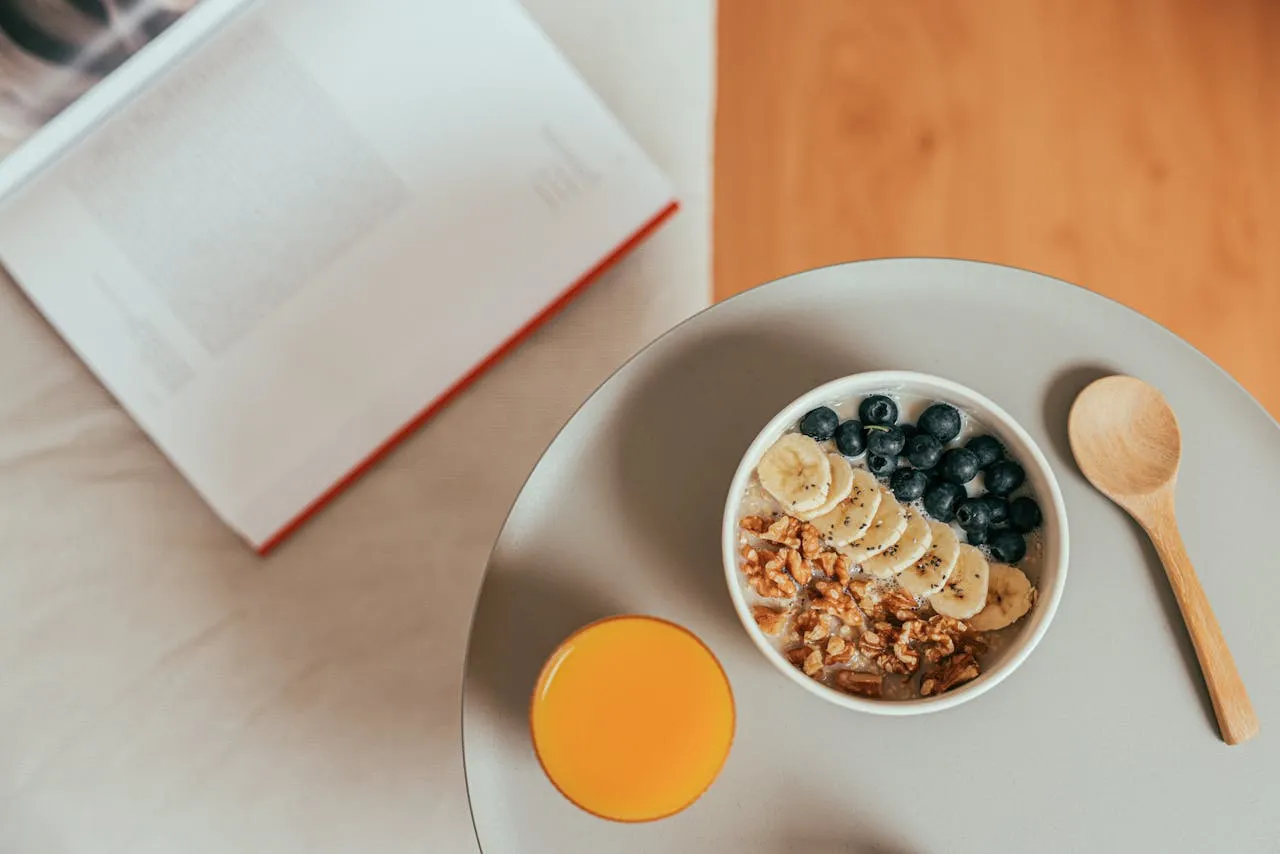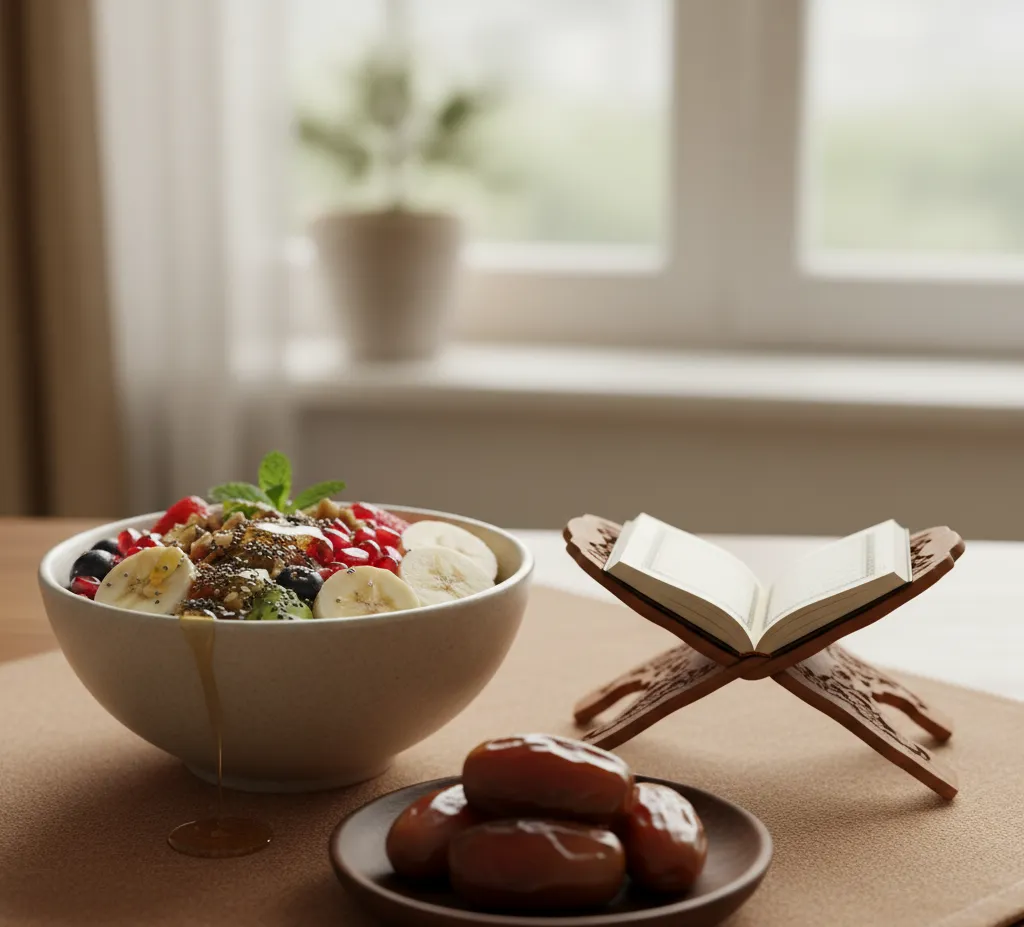
Introduction
Do you ever feel your breakfast is missing something? You eat, but you lack energy. You feel disconnected. Many of us want a healthy Islamic diet that does more than just fill our stomachs. What if your first meal could nourish your faith as well as your body? The teachings of the Prophet Muhammad (PBUH) offer a beautiful path to this balance.
This is the core of Sunnah health. At healthtolife, we believe true wellness starts by connecting modern nutrition with timeless Prophetic wisdom. Let’s explore how a simple Sunnah breakfast can transform your morning.
Table of Contents
- What is a Sunnah Diet?
- Why is breakfast so important in the Sunnah?
- What are the key ingredients in a Sunnah breakfast bowl?
- Your Sunnah Breakfast Bowl Recipe
- Beyond the Bowl: Sunnah Eating Habits
- A Bowl for All Seasons
- The Science Behind the Sunnah
- Conclusion: Your Path to Islamic Wellness
- References and Further Reading
- Frequently Asked Questions
- Related Video | Best Food for Anaemia, Iron Deficiency | Talbina Breakfast | Sunnah-Based Healing | About Lifestyle
What is a Sunnah Diet?
A Sunnah diet involves choosing foods mentioned in the Quran or by the Prophet Muhammad (PBUH), focusing on what is Halal (permissible) and Tayyib (pure and wholesome). It’s a holistic approach to eating that considers the spiritual and physical benefits of our food choices. This goes beyond a simple list of items. It is about mindful consumption. The goal is to nourish the body as an act of worship, aligning our daily habits with Islamic principles for complete well-being.

This concept is supported by Islamic resources like IslamQA, which detail the principles of Halal and Tayyib. By focusing on Sunnah foods for breakfast, we take a practical step towards this lifestyle. This approach forms the foundation of a truly healthy Islamic diet.
Why is breakfast so important in the Sunnah?
A Sunnah breakfast provides sustained energy, honours Prophetic tradition, and turns a daily meal into an act of worship. It sets a mindful tone for the entire day. This practice aligns your physical health with your spiritual goals, making your morning routine deeply meaningful and beneficial for both body and soul.
The Prophet Muhammad (PBUH) emphasised the importance of the morning meal. This practice gives your body the fuel it needs after a night of fasting. More importantly, it grounds your day in a blessed routine. Choosing Sunnah foods for breakfast is a simple way to earn a reward. It transforms eating from a mundane task into a spiritual practice. This habit builds a strong foundation for your healthy Islamic diet.
What are the key ingredients in a Sunnah breakfast bowl?
The core ingredients are dates, barley, olive oil, honey, and milk or yoghurt. Each of these foods is specifically mentioned in the Quran or Hadith for its unique health and spiritual properties. Together, they create a complete, balanced, and deeply nourishing meal that honours Islamic tradition.
Dates, like the Ajwa variety, are a great way to break your fast. Barley forms the base of Talbina, a renowned prophetic comfort food. Olive oil is praised as a blessed source of fat. Raw honey is considered a natural remedy. Milk and yoghurt provide protein for strength. Including these Sunnah superfoods in your Islamic breakfast is a simple step toward holistic health.
Your Sunnah Breakfast Bowl Recipe
This simple Sunnah breakfast bowl recipe combines cooked barley, creamy yoghurt, chopped dates, a drizzle of honey, and a hint of olive oil. It’s a flexible recipe that honours prophetic traditions while providing a powerful, energising start to your day. You can prepare the base in advance for a quick morning meal.
Start with a base of cooled, prepared barley porridge (Talbina) or plain yoghurt. Top it with a handful of chopped dates and nuts. Add a generous drizzle of raw honey and a teaspoon of extra virgin olive oil. Gently mix everything. This Sunnah recipe is your template for a truly healthy and satisfying Islamic breakfast. Feel free to add seeds or seasonal fruits.
Beyond the Bowl: Sunnah Eating Habits
The Sunnah teaches mindful eating habits that improve digestion and gratitude. These include eating with the right hand, saying Bismillah, sharing food, and not overfilling the stomach. These simple practices transform a daily meal into a conscious act of worship and community, enhancing the benefits of your healthy Islamic diet.
Start by saying ‘Bismillah’. Eat with your right hand and take smaller bites. The Prophet (PBUH) advised that the stomach should be one-third for food, one-third for drink, and one-third for air. This prevents sluggishness. Express gratitude with ‘Alhamdulillah’ when finished. These manners make every meal, including your Sunnah breakfast, more meaningful. They are a core part of Sunnah health.
A Bowl for All Seasons
Absolutely. This Sunnah breakfast bowl is an ideal Suhoor meal. The combination of complex carbohydrates from barley and natural sugars from dates provides slow-releasing energy. This helps maintain hydration and stave off hunger and thirst throughout the long day of fasting, making it a perfect healthy Ramadan Suhoor recipe.
For Suhoor, prepare the bowl with a slightly larger serving of barley. You can use more yogurt for extra protein. The goal is sustained energy. Outside of Ramadan, it remains a powerful Sunnah breakfast. It’s a simple way to make a healthy Islamic diet a consistent part of your life. The recipe is versatile for any season or need.
The Science Behind the Sunnah
Is there modern proof for these ancient foods?
Yes, contemporary nutritional science consistently validates the health benefits of core Sunnah foods. Studies show that dates, barley, olive oil, and honey possess properties that support digestion, heart health, and stable energy levels, providing a scientific foundation for the wisdom of the Prophetic diet discussed on healthtolife.
For example, barley is rich in beta-glucan, a fibre proven to help manage cholesterol. The polyphenols in extra virgin olive oil are powerful antioxidants. Dates offer a unique blend of soluble fibre and essential minerals. This modern understanding doesn’t replace faith. Instead, it strengthens our belief in the divine wisdom of a Sunnah health lifestyle, showing how a healthy Islamic diet is designed for our well-being.
Conclusion: Your Path to Islamic Wellness

True wellness is about harmony. It connects your body, mind, and faith. A Sunnah breakfast is a simple, powerful step on this path. It turns a daily routine into a rewarding practice. You nourish yourself with foods chosen for their spiritual and physical blessings.
This bowl is more than a meal. It is a reminder of Prophetic wisdom. It is a practical tool for a healthy Islamic diet. We invite you to make this Sunnah recipe your own. Let it be a foundation for your well-being. Visit healthtolife for more ways to weave faith into your health journey. Start your day with intention and nourishment.
References and Further Reading
This article is based on verified information from respected health authorities, including the World Health Organisation (WHO) and safeena.org. Every fact is carefully checked to ensure accuracy and trustworthiness.
For research-backed insights on health, disease prevention, nutrition, and wellness from an Islamic perspective, explore our Health & Islam article library.
At HealthToLife.in, our mission is simple: to provide safe, practical, and easy-to-understand health information. Your well-being is our top priority, and our team regularly reviews the latest research to ensure our content remains up-to-date.
If this article helped you, we’d love to hear your thoughts in the comments. Thank you for trusting HealthToLife as your guide to holistic health and wellness.
Frequently Asked Questions
Ques-1. What is the Sunnah way to break a fast?
Ans: The Sunnah way to break a fast is to eat a few fresh dates. If dates are not available, drinking a few sips of water is recommended. This practice, based on the teachings of the Prophet Muhammad (PBUH), provides quick energy and gently prepares the stomach for a larger meal.
Ques-2. Can I make Talbina in advance?
Ans: Yes, you can prepare Talbina in advance. Cook the barley porridge and let it cool. Store it in an airtight container in the refrigerator for 2-3 days. This makes your Sunnah breakfast very quick to assemble on a busy morning, helping you maintain a healthy Islamic diet with ease.
Ques-3. Is this breakfast bowl suitable for children?
Ans: Absolutely. This bowl is an excellent way to introduce children to Sunnah foods. You can adjust the texture and sweetness to their liking. Using more yoghurt and honey can make it more appealing. It’s a nutritious alternative to sugary cereals.
Ques-4. Where can I find more Sunnah food recipes?
Ans: You can find a growing collection of practical and modern Sunnah recipes right here on our website, healthtolife. We are dedicated to helping you easily incorporate the principles of Sunnah health into your daily meals for lasting wellness.
Related Video | Best Food for Anaemia, Iron Deficiency | Talbina Breakfast | Sunnah-Based Healing | About Lifestyle
Was this article helpful?
Stay updated with the latest posts on HealthToLife—expert health tips, wellness trends, and life-changing advice you don’t want to miss. Click to explore.



